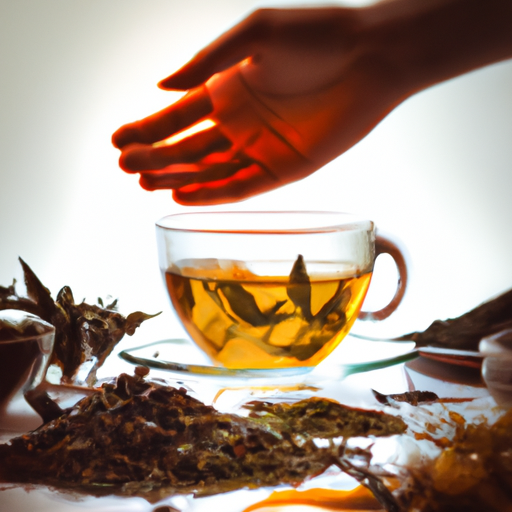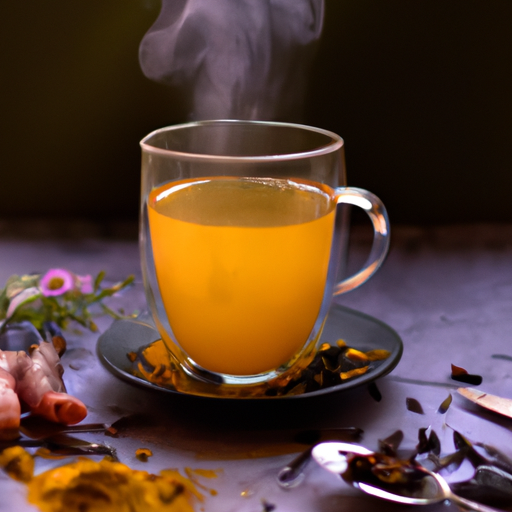Turmeric has been utilized for thousands of years in Ayurvedic and Chinese medicine. It is believed to possess over 100 medicinal properties, making it a highly versatile and powerful natural remedy.
One of the most popular ways to consume turmeric is through turmeric tea, which has been gaining popularity in recent years due to its many potential health benefits. Turmeric tea is a simple and delicious way to incorporate this powerful spice into your daily routine.
Whether you’re looking to boost your immune system, reduce inflammation, or improve digestion, turmeric tea may be able to help. In this article, we’ll explore the history and traditional uses of turmeric, the nutritional value of this spice, the potential health benefits of turmeric tea, and how to incorporate it into your diet.
So sit back, relax, and learn about the incredible benefits of turmeric tea for your body and mind.
Key Takeaways
- Turmeric tea can boost the immune system, reduce inflammation, and improve digestion.
- Turmeric tea has anti-inflammatory and antioxidant properties that can help reduce wrinkles, fine lines, and age spots, and stimulate collagen production for healthy skin.
- Turmeric tea may alleviate symptoms of arthritis, improve brain function, and reduce the risk of heart disease.
- Ethical sourcing and sustainable production of turmeric are crucial for a more equitable and healthier world, and choosing brands that prioritize sustainable practices and packaging can help contribute to a healthier planet.
The History and Traditional Uses of Turmeric
You’re probably unaware of the rich history and traditional uses of turmeric, but once you learn about its powerful healing properties, you’ll be amazed.
Turmeric has been used for thousands of years in Ayurvedic and Traditional Chinese Medicine to treat a wide variety of ailments. In traditional Indian medicine, turmeric was believed to be a blood purifier and was used to treat skin conditions, digestive issues, and respiratory problems. It was also used as a natural antiseptic for cuts and wounds.
In addition to its medicinal properties, turmeric was also used as a coloring agent for textiles and food. It was even used in religious ceremonies, where it was believed to have spiritual and protective qualities.
With such a long and fascinating history, it’s no wonder that turmeric has become a popular ingredient in modern health and wellness practices. But what makes turmeric so special? Let’s take a closer look at its nutritional value.
The Nutritional Value of Turmeric
The nutritional value of turmeric is like a powerful punch of sunshine, providing a burst of essential vitamins and minerals that can help boost overall health.
Here are some of the key benefits and culinary uses of turmeric:
-
Anti-inflammatory properties: Turmeric contains curcumin, a compound known for its anti-inflammatory effects. It may help alleviate symptoms of arthritis, improve brain function, and reduce the risk of heart disease.
-
Antioxidant effects: Turmeric is rich in antioxidants that can help protect against cell damage caused by free radicals. It may also have anti-aging effects and protect against chronic diseases.
-
Immune-boosting: Turmeric has been used for centuries to boost the immune system and fight infections. Its antimicrobial properties may help prevent and treat respiratory infections, such as the common cold.
-
Culinary uses: Turmeric is a versatile spice that can be used in a variety of dishes, from curries and stews to smoothies and teas. It can add flavor, color, and nutrition to your meals.
With its many health benefits and culinary uses, turmeric is a valuable addition to any diet.
Now, let’s explore how to make a delicious cup of turmeric tea.
The Making of Turmeric Tea
If you want to enjoy a warm and comforting cup of turmeric tea, you’ll need to know how to make it. Luckily, there are several methods you can try, from steeping fresh turmeric root to using powdered turmeric.
Along with the basic recipe, many people like to add additional ingredients to their turmeric tea. These include honey, lemon, ginger, or cinnamon, which can enhance both the flavor and the potential health benefits.
Preparation methods
Get ready to spice up your tea game with these simple and delicious methods for preparing turmeric tea. There are different types of turmeric tea, but the most common ones are made from turmeric root powder or fresh turmeric.
To brew turmeric tea, boil water in a pot or kettle and add turmeric powder or grated fresh turmeric. Let it simmer for 10-15 minutes, then strain the tea and add honey or lemon to taste. You can also add other flavor additives such as ginger, cinnamon, or black pepper to enhance the taste and health benefits.
Another brewing technique is to make a turmeric paste and store it in the fridge for later use. To make the paste, mix turmeric powder with water or coconut oil until it forms a thick paste. Use a teaspoon of the paste to make a cup of tea by adding it to boiling water and letting it simmer for a few minutes. This method is convenient for those who don’t have fresh turmeric or prefer a more concentrated flavor.
Now that you know how to prepare turmeric tea, let’s explore some common additives that can take your turmeric tea to the next level.
Common additives
Spice up your tea game even more by adding a sprinkle of cinnamon or a pinch of ginger to your turmeric brew. These popular flavors not only enhance the taste but also add to the health benefits of your tea.
Cinnamon is known for its anti-inflammatory properties and ginger is known to aid digestion. Adding these to your turmeric tea can enhance the antioxidant and anti-inflammatory effects of turmeric, making it a powerful immune booster.
However, it’s important to note that some additives may not be suitable for everyone. People with certain health concerns, such as blood thinning disorders, may need to avoid adding cinnamon to their turmeric tea. Similarly, excessive consumption of ginger can cause heartburn and may not be suitable for people with gastroesophageal reflux disease (GERD). It’s always recommended to consult with a healthcare professional before adding any new ingredients to your diet.
Moving on to the potential health benefits of turmeric tea, it’s important to note that research is ongoing and more evidence is needed to fully understand the extent of its benefits.
Potential Health Benefits of Turmeric Tea
Turmeric tea can boost your immune system, relieve inflammation, and improve brain function. Curcumin, the active ingredient in turmeric, has powerful antioxidant and anti-inflammatory properties that can help protect your body against disease and illness.
Studies have shown that turmeric tea may be effective in reducing symptoms of arthritis, reducing the risk of heart disease, and even preventing certain types of cancer. While turmeric tea is generally safe to consume, there are some potential side effects to keep in mind.
Consuming large amounts of turmeric may cause upset stomach, nausea, or diarrhea. It’s important to follow dosage recommendations and consult with a healthcare provider before making any significant changes to your diet or supplement routine.
The science behind turmeric tea is fascinating and continues to be studied. By incorporating this simple and delicious beverage into your daily routine, you can potentially reap numerous health benefits. So why not give turmeric tea a try and see how it can improve your overall well-being?
The Science Behind Turmeric Tea
When you dive into the science behind turmeric tea, you’ll find that the bioactive compounds in turmeric are what give it many of its potential health benefits.
Studies on human subjects have shown promising results, with improvements in markers of inflammation, blood sugar control, and cognitive function.
However, it’s important to note that much of the research has limitations, such as small sample sizes and lack of long-term studies.
Bioactive compounds
You’ll be pleased to know that turmeric tea contains bioactive compounds that have potential health benefits. Some of these compounds include curcumin, which is known for its anti-inflammatory and antioxidant properties, as well as turmerones, which have been shown to have anti-cancer effects. However, it’s important to note that the bioavailability of these compounds can be limited, which means that the body may not absorb them as effectively as we would like.
Despite the potential benefits of bioactive compounds in turmeric tea, there are also some drawbacks to consider. For example, high doses of curcumin may cause digestive issues, and some people may be allergic to turmeric. Additionally, not all turmeric products are created equal, and the quality and potency of the turmeric can vary depending on the source and availability.
This is why it’s important to choose a high-quality turmeric tea and to consult with a healthcare professional before incorporating it into your diet. With that said, let’s move on to the next section, which discusses studies on human subjects.
Studies on human subjects
If you’re interested in the potential health benefits of turmeric tea, it’s important to look at the results of studies on human subjects.
One of the most well-known effects of turmeric is its anti-inflammatory properties. A study conducted on 45 rheumatoid arthritis patients found that those who took curcumin (the active compound in turmeric) saw a significant decrease in inflammation and joint pain.
Another study on 60 people with osteoarthritis found that those who took curcumin reported less pain and improved physical function compared to those who took a placebo.
In addition to its effects on inflammation, turmeric has also been shown to potentially improve cognitive function. A study on 30 healthy adults found that those who took a curcumin supplement had improved working memory and attention compared to those who took a placebo.
Another study on 60 older adults found that those who took a curcumin supplement had improved memory and mood compared to those who took a placebo. While these studies show promising results, it’s important to keep in mind the limitations of the research and the need for further studies to confirm these potential benefits.
Limitations of the research
Now, before you start incorporating turmeric into your daily routine, it’s worth noting that the studies conducted on its potential health benefits have some limitations that you should be aware of.
One of the main challenges is the methodological issues of the studies. Many of the studies have been conducted on a small sample size, which makes it difficult to generalize the results to the general population. Additionally, some studies have not been conducted over a long enough period, making it difficult to determine the long-term effects of consuming turmeric.
Another limitation is the generalizability issues of the studies. Most of the studies have been conducted on healthy individuals, which makes it challenging to determine how turmeric may affect those with underlying health conditions. Additionally, most studies have been conducted on individuals living in specific geographical regions, which may limit the generalizability of the results to individuals living in other parts of the world.
Now, as you move on to the next section about the risks and side effects, it’s essential to keep in mind the limitations of the research and approach turmeric consumption with caution.
Risks and Side Effects
Be aware of the potential dangers and long-term effects associated with consuming turmeric tea, as it can cause gastrointestinal discomfort if consumed in excessive amounts. Additionally, allergic reactions and drug interactions are possible when consuming turmeric tea. It’s important to talk to your doctor before incorporating turmeric tea into your diet if you’re taking any medications or have any pre-existing medical conditions.
In rare cases, consuming large amounts of turmeric tea can lead to liver problems, so it’s important to consume it in moderation. However, when consumed in appropriate amounts, turmeric tea has been shown to have anti-inflammatory and antioxidant properties that can benefit the body.
In the next section, we’ll discuss how to incorporate turmeric tea into your diet to reap these potential benefits.
How to Incorporate Turmeric Tea into Your Diet
While turmeric tea has some risks and side effects, it can still be a great addition to your diet. So, how can you incorporate turmeric tea into your daily routine?
Firstly, you’ll want to know the benefits of drinking it. Turmeric tea has a wide range of health benefits, including reducing inflammation, improving brain function, and aiding digestion. To get the most out of your turmeric tea, it’s important to know the best brewing methods. You can experiment with different brewing times and temperatures to find what works best for you.
Once you’ve brewed your turmeric tea, there are many ways you can enjoy it. Here are some turmeric tea recipes and flavor combinations to try:
-
Golden milk: Add coconut milk, cinnamon, ginger, and honey to your turmeric tea for a warm and comforting drink.
-
Turmeric lemonade: Mix your turmeric tea with lemon juice, honey, and sparkling water for a refreshing summer drink.
Remember that turmeric tea can also be added to smoothies, soups, and other recipes for an extra boost of flavor and health benefits.
Now that you know how to incorporate turmeric tea into your diet, let’s explore some alternative uses of turmeric.
Alternative Uses of Turmeric
If you’re curious about the alternative uses of turmeric beyond drinking it as tea, you may want to explore its benefits for skincare, natural remedies, and culinary uses. Turmeric has anti-inflammatory and antioxidant properties that make it a popular ingredient in skincare products.
It’s also been used as a natural remedy to alleviate a range of ailments, from digestive issues to joint pain. Finally, turmeric is a versatile spice that can add flavor and color to a variety of dishes, from curries to smoothies.
So, if you’re looking to expand your use of turmeric, consider incorporating it into your skincare routine, trying it as a natural remedy, or experimenting with it in the kitchen.
Skincare
Turmeric tea can offer a range of benefits for your skin, including anti-aging and acne treatment. The active ingredient in turmeric, curcumin, has potent anti-inflammatory and antioxidant properties that can help reduce wrinkles, fine lines, and age spots.
Additionally, turmeric tea can stimulate collagen production, which is essential for maintaining healthy, youthful-looking skin. If you struggle with acne, turmeric tea may also be a natural remedy worth trying.
Curcumin has been shown to have anti-bacterial and anti-inflammatory effects on the skin, which could help reduce acne breakouts. Drinking turmeric tea regularly may also help regulate oil production and unclog pores, leading to clearer, smoother skin.
Moving on to the next section about natural remedies, there are several other ingredients that can complement the benefits of turmeric tea for your skin.
Natural remedies
You can enhance the herbal benefits of turmeric tea for your skin by incorporating other holistic remedies. Mixing honey with turmeric tea can create a natural face mask that can help soothe and moisturize your skin. Honey contains antibacterial properties that can help reduce acne and inflammation. Aloe vera, on the other hand, can help soothe sunburns and other skin irritations. It also has anti-inflammatory properties that can help reduce redness and swelling. Lastly, adding green tea to your turmeric tea can help reduce dark circles and puffiness around your eyes. Green tea contains antioxidants that can help improve your skin’s appearance.
To give you a better idea of the different natural remedies you can mix with turmeric tea, here is a table that shows their respective benefits:
| Natural Remedy | Benefits |
|---|---|
| Honey | Antibacterial, moisturizing |
| Aloe Vera | Soothing, anti-inflammatory |
| Green tea | Antioxidant, reduces dark circles and puffiness |
Incorporating these natural remedies with turmeric tea can provide a holistic approach to your skincare routine. Not only can they help improve your skin’s appearance, but they can also provide additional health benefits. Now, let’s move on to exploring the culinary uses of turmeric tea.
Culinary uses
Get ready to add some spice to your meals with the culinary versatility of turmeric. Beyond its use as a natural remedy, turmeric is a staple in many kitchens around the world, adding both flavor and color to a variety of dishes.
But did you know that turmeric can also be used to make a delicious and healthful tea? Turmeric tea is a popular beverage that has been enjoyed in many cultures for centuries. To make it, simply steep fresh or dried turmeric root in hot water for several minutes, and then strain out the solids. You can drink it plain, or add honey, lemon, or other herbs and spices to suit your taste.
Not only is turmeric tea a tasty and warming drink, but it also has numerous health benefits, including anti-inflammatory, antioxidant, and anti-cancer properties. So, the next time you’re looking for a new way to enjoy this versatile spice, give turmeric tea a try!
Now, let’s move on to the important topic of sustainability and ethical issues surrounding the production of turmeric.
Sustainability and Ethical Issues
When it comes to sustainability and ethical issues surrounding turmeric production, there are a few key points to consider.
Firstly, it’s important to evaluate the sourcing practices of the turmeric you consume. Look for brands that use sustainable and responsible methods of farming and harvesting.
Additionally, fair trade and labor practices should also be taken into account, ensuring that the workers involved in the process are treated fairly and receive just compensation.
Finally, the environmental impact of turmeric production should also be considered, with a focus on reducing waste and minimizing negative effects on the surrounding ecosystem.
Sourcing practices
Did you know that over 80% of turmeric comes from India, where it’s been used for centuries in Ayurvedic medicine?
Ethical sourcing and sustainable production of turmeric are crucial to ensure that the supply chain is environmentally friendly, socially responsible, and economically viable. This involves working with farmers and producers who prioritize fair labor practices, biodiversity conservation, and community development.
Many turmeric farmers in India face challenges such as low yield, soil degradation, and lack of access to markets. Ethical sourcing practices involve providing them with adequate training, resources, and support to improve their livelihoods and protect the environment.
Sustainable production, on the other hand, includes using organic farming methods, reducing water usage, and minimizing waste. By choosing turmeric products that are ethically sourced and sustainably produced, you can contribute to a more equitable and healthier world.
Now let’s learn about fair trade and labor practices in the turmeric industry.
Fair trade and labor practices
You’ll witness the positive impact of fair trade and labor practices on the lives of turmeric farmers in India. Fair trade certification ensures that farmers are paid a fair price for their products and are provided with safe working conditions. This certification also helps to prevent worker exploitation and ensures that workers have access to important resources like education and healthcare.
In addition to fair trade certification, many companies are implementing labor practices that prioritize the well-being of their workers. Some companies provide their workers with additional benefits like paid time off and maternity leave. These practices not only benefit the workers, but also improve the quality of the product being produced. By prioritizing fair trade and labor practices, companies can ensure that their products are not only ethically produced, but also of high quality.
Moving on to the subsequent section about ‘environmental impact’, it’s important to note that fair trade and labor practices can also have a positive effect on the environment.
Environmental impact
Now that you have a better understanding of fair trade and labor practices involved in producing turmeric tea, let’s delve into its environmental impact.
The production of turmeric tea can leave a significant carbon footprint due to the transportation of raw materials and the energy used in the manufacturing process. However, some companies have taken steps towards sustainability by implementing eco-friendly practices, such as using renewable energy sources and reducing waste.
In addition to reducing their carbon footprint, sustainable packaging is also an important aspect of environmental impact. Many tea companies are now using biodegradable or compostable materials for their packaging to reduce plastic waste.
As a consumer, you can also make a difference by choosing brands that prioritize sustainable practices and packaging. By making small choices like this, you can help contribute to a healthier planet and ensure that the production of your turmeric tea has a positive impact on the environment.
Frequently Asked Questions
Can turmeric tea help with weight loss?
If you’re looking to boost your metabolism and aid weight loss, turmeric tea could be a helpful addition to your routine. Studies suggest that the active compound in turmeric may help regulate blood sugar and reduce inflammation, supporting a healthy weight.
Is it safe to consume turmeric tea during pregnancy?
If you’re pregnant, it’s best to consult your doctor before consuming turmeric tea. There are safety concerns about its consumption during pregnancy, and it’s important to ensure the safety of both mother and baby.
How much turmeric should be used to make a cup of turmeric tea?
To make a cup of turmeric tea, use 1 teaspoon of turmeric powder and steep in hot water for 5-10 minutes. Experiment with other spices and herbs for added flavor. Avoid excessive consumption as it may cause side effects.
Does turmeric tea have any effect on anxiety or depression?
Struggling with anxiety or depression? Turmeric tea may be worth a try. Studies suggest curcumin, the active ingredient in turmeric, can enhance mood and alleviate anxiety symptoms. Sip your way to anxiety relief and a brighter outlook.
Can turmeric tea help with skin conditions such as acne or eczema?
Turmeric tea benefits for skin include anti-inflammatory and antioxidant properties. It may help with conditions such as acne and eczema. Turmeric tea also improves digestion with its anti-inflammatory and antioxidant properties.
Conclusion
Congratulations! Now you know all about the potential health benefits of turmeric tea.
But before you rush to the kitchen to brew yourself a cup, it’s important to consider both the risks and the ethical concerns surrounding this spice.
On one hand, turmeric has been shown to have anti-inflammatory and antioxidant properties, potentially helping with conditions such as arthritis, heart disease, and cancer. However, it’s important to note that turmeric can interact with certain medications and may cause gastrointestinal issues in some individuals.
Furthermore, the growing demand for turmeric has led to concerns about sustainability and fair labor practices. When purchasing turmeric, look for brands that prioritize ethical sourcing and consider using the spice in moderation to reduce waste.
In conclusion, turmeric tea can be a delicious and potentially beneficial addition to your diet, but it’s important to approach it with caution and mindfulness. By considering the science, risks, and ethical concerns surrounding turmeric, you can make informed choices to support both your health and the wellbeing of others.










